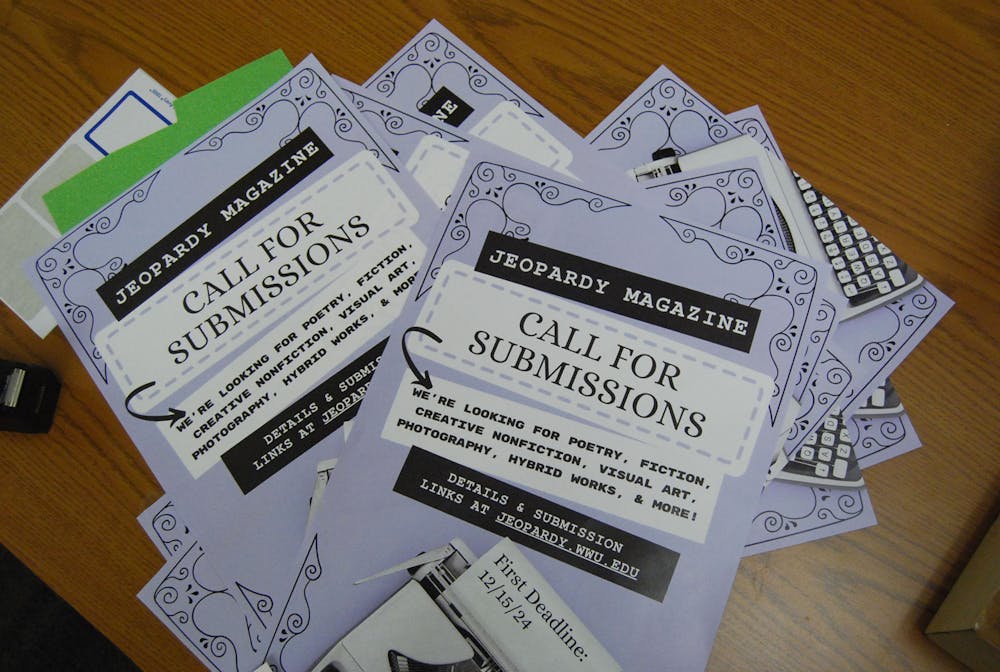For the editors of Jeopardy Magazine, these fast-passing weeks of November are the calm before the storm. As the literary and arts magazine approaches their first submission deadline of Dec. 15, 2024, the editors are focused on spreading the word about their publication before the floodgates of entries open.
Jeopardy Magazine, which was first published in 1965, is an annual collection of poetry, fiction, creative nonfiction and visual pieces distributed by Western Washington University. Run by students and exclusively featuring student, faculty and alumni work, the magazine aims to represent Western’s creative community.
“Jeopardy is really unique in that it's a literary magazine that has an incredibly small body of submitters and a very small audience as well,” said Summer Barnett, the editor-in-chief of Jeopardy and a fourth-year student at Western. “To be able to represent a really particular community is so exciting. There’s so much you can do there.”
Barnett made it clear that, while Jeopardy is known as a literary magazine, they encourage the Western community to submit visual works of art as well. Whether that be photography, graphic design or anything in between, Jeopardy wants it all.
“We enjoy creating a collaboration between visual art and literary art,” Barnett said. “It’s really exciting for us to be a place for more hybrid works or for things that don't necessarily fit within strict genre structures. Jeopardy feels like a place where people can experiment and let their creativity be the guiding force.”
Hana Berisha, a fourth-year student at Western, had two visual pieces published in Jeopardy. After being encouraged by a friend who worked on the magazine, Berisha found that submitting her work was easier than she thought.
“She said they don’t receive too many visual works, so I thought why not,” Berisha said. “I hadn’t thought about finding a place to put my work online other than social media, so I thought this could be cool and official, which is nice to feel about your work.”
While it may seem like a huge hurdle to jump, submitting a piece for publication can be an extremely gratifying experience and a monumental part of a creator’s career, according to Jane Wong, the editor-in-chief of the Bellingham Review and Western professor.
“I think that one of the biggest things when you're a writer is the moment in time in which you decide to share your work with the larger world,” Wong said. “It’s a moment of like, ‘Here is something I've created, here's the art I've created and I want to share it with people.’”
Wong believes that getting work published can give writers and other creatives the boost in confidence they need to keep creating in addition to giving them a sense of accomplishment.
Having even one published work makes it much easier to get future pieces published, according to EJ Colen, a senior instructor at Western and the faculty advisor for Jeopardy.
“Publishing begets publishing,” Colen said. “Once you’ve had one piece published, each subsequent editor will take your work just that much more seriously. Students have a much better chance of being published in Jeopardy than in other publications that draw submissions worldwide.”
When it comes to submitting work, the Jeopardy editors encourage anyone in the Western community to do it without fear.
“Submit pieces to Jeopardy, please,” said Morgan Brothers, the fiction editor for Jeopardy and a fourth-year student at Western. “It's less about making sure that you've created this perfect polished piece and more about doing something with it.”
Adele Johnston, the poetry editor for Jeopardy and second-year student at Western, shared the same sentiment, saying there is no harm in submitting a piece because you never know what could happen.
“You have nothing to lose by submitting to Jeopardy,” Johnston said. “The worst outcome is that we don't accept your piece and nothing changes for you.”
Even if a piece of work doesn’t make it into Jeopardy, that doesn’t have to be the end of the road. Writers who were rejected by Jeopardy can reach out to editors to get feedback on their pieces.
“Email us if you've been rejected and we will talk to you about your work,” Barnett said. “We are happy to have a conversation with you about ways you can improve your piece.”
The Jeopardy editors are committed to making the path to publication as fair for writers as they can. By anonymizing the submission process, the editors have no way of knowing whose work they are reading.
“Our editor-in-chief, [Barnett], very thoroughly anonymizes all submissions, which makes it so that I don't have any personal stake in what I'm doing,” Johnston said. “So if you know me, that shouldn't be a barrier to your submitting work. That goes for all of the editors.”
Any students who are interested in submitting a piece to Jeopardy can view their submission guidelines here.
Aidan Hadley (he/him) is a campus life reporter for The Front this quarter. He is a third-year student at WWU studying news/editorial journalism. Outside of reporting, Aidan enjoys baking, eating good food and finding a new TV show to watch. You can reach him at aidanh.thefront@gmail.com.






